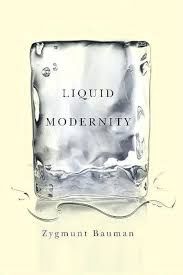

– Zygmunt Bauman’s Liquid modernity –
Zygmunt Bauman, a prominent Polish sociologist, coined the term “liquid modernity” to describe the fluid, ever-changing nature of contemporary society.
In his eponymous book “Liquid Modernity,” Bauman argues that we have moved away from the stable, predictable structures of the past to a world characterized by instability, uncertainty, and perpetual transformation.
“Liquid modernity” is a metaphor for the fluid, uncertain, and rapidly changing conditions of modern life.
Unlike the “solid” phase of modernity, characterized by stable institutions, predictable social roles, and long-term commitments, liquid modernity reflects a world where these certainties have dissolved, leaving individuals to navigate a complex, ever-shifting landscape of identity, work, and relationships.
Liquid modernity, according to Bauman, represents the breakdown of these fixed structures of class, state, institutions etc.
The social structures and institutions that once provided a sense of belonging and order have become fragile. Now, people are free to redefine themselves and change their circumstances, but this freedom also creates anxiety and insecurity.
Bauman argues that in liquid modernity, individualisation is an imminent outcome.
While it creates opportunities for personal growth and self-expression, it also leads to a sense of insecurity.
Relationships have become more transient and superficial. People are increasingly focused on short-term gratification and are less willing to invest in deep, enduring connections.
Bauman refers to this as the “liquidity” of human bonds, where relationships are easily formed and easily dissolved.
This shift has profound implications for how individuals experience learning, love, friendship, and community.
The concept of consumerism is another important aspect of Bauman’s analysis.
Bauman argues that in contemporary society, identity is no longer a given, but rather a task that each individual must continuously work on and redefine.
The search for identity has become an ongoing project.
Consumer identities are often ephemeral and unsatisfying.
In liquid modernity, each person is “guilty of his destiny, of what happens to him or not.”
This shift places a heavy burden on individuals to navigate the complexities of an ever-changing world.
While Bauman paints a bleak picture of contemporary life, with its focus on insecurity, anxiety, and fragmentation, it is also possible to see liquid modernity as a time of great opportunity.
The breakdown of rigid social structures does allow for greater freedom of choice, innovation, and personal development.
This book (besides his other work) is a must read for marketers in an age where technology, globalization, and shifting norms continue to reshape the way consumers live, work, and relate to one another, faster than ever before
